#Custom Metaverse Development
Explore tagged Tumblr posts
Text
In today’s rapidly evolving digital landscape, the concept of the metaverse has gained significant traction. As businesses and individuals seek to create immersive experiences that bridge the gap between the physical and virtual worlds, companies like Simulanis Solutions have emerged as leaders in this innovative space. As a premier Metaverse Development Company, Simulanis is dedicated to pushing the boundaries of what’s possible in digital interaction
#Metaverse Development Services#Metaverse Solutions Provider#Metaverse Platform Development#Custom Metaverse Development#Metaverse Game Development#Metaverse App Development#3D Metaverse Development#Blockchain Metaverse Development#Metaverse Experience Design#Metaverse VR/AR Integration#Virtual Worlds Development#Metaverse Virtual Reality Development#NFT Integration in Metaverse#Interactive Metaverse Solutions#Metaverse for Business Solutions#Metaverse Environment Creation#Metaverse Real Estate Development#Next-gen Metaverse Development#Metaverse Integration Services#Metaverse Customization Services
0 notes
Text

Custom 2D, 3D, AR, and VR Game Development Services
#Game Development Company#Custom Game Development#Game App Development Services#Mobile game development company#Professional Game Development#Custom Game Solutions#Expert Game Development#Game Application Design#Custom Game Development Services#Metaverse Game Development#nft gaming platform development#nft game development#unity game development services#unity development services#unity game development company#Unity3D Game Development Company#unity 3d game development#unity3d game development services#unity mobile game development#mobile game development company
0 notes
Text
Exploring Metaverse Development Companies in Singapore: Pioneering the Future of Virtual Worlds
In recent years, the concept of the metaverse has captured the imagination of tech enthusiasts and innovators worldwide.
This digital realm, characterized by interconnected virtual spaces, immersive experiences, and persistent online communities, presents boundless opportunities for creativity, collaboration, and commerce.
As the metaverse gains momentum, Singapore stands at the forefront of its development, with several pioneering companies leading the charge.
In this blog, we delve into the landscape of metaverse development companies in Singapore, exploring their contributions to shaping the future of virtual worlds.
Unity Technologies Singapore:
Unity Technologies, a global leader in real-time 3D development platforms, has a significant presence in Singapore.
With its powerful game engine and development tools, Unity empowers creators to build immersive experiences for the metaverse.
Unity's Singapore office serves as a hub for innovation, providing support to developers and fostering the growth of the local metaverse ecosystem.
Through initiatives like Unity Connect and Unity Accelerator, the company facilitates collaboration and knowledge sharing among metaverse developers in Singapore and beyond.
Kairos Singapore:
Kairos is a Singapore-based startup specializing in virtual reality (VR) and augmented reality (AR) technologies.
Leveraging advanced computer vision and spatial computing, Kairos is at the forefront of creating immersive metaverse experiences.
The company's innovative solutions span various industries, from gaming and entertainment to education and training.
Kairos is actively involved in research and development, pushing the boundaries of what's possible in the metaverse and driving technological advancements on a global scale.
Techgropse:
Techgropse is a Singaporean app development company that focuses on creating metaverse-ready applications and platforms.
Specializing in blockchain integration and decentralized technologies, Techgropse is driving innovation in the emerging field of blockchain-based virtual worlds.
The company's projects range from virtual marketplaces and social platforms to decentralized autonomous organizations (DAOs) operating within the metaverse.
Techgropse's commitment to privacy, security, and interoperability makes it a key player in shaping the future of decentralized virtual environments.
AuroraXR:
AuroraXR is a Singapore-headquartered startup specializing in creating immersive virtual experiences for businesses and consumers.
With a focus on VR, AR, and mixed reality (MR) technologies, AuroraXR is bridging the gap between the physical and digital worlds.
The company's customizable solutions cater to various industries, including real estate, tourism, retail, and events.
AuroraXR's innovative approach to storytelling and user engagement is redefining how brands connect with their audiences in the metaverse.
Gluon Technologies:
Gluon Technologies is a Singaporean firm that develops advanced AI-driven solutions for the metaverse.
By harnessing the power of artificial intelligence, machine learning, and natural language processing, Gluon is creating intelligent virtual agents and NPCs (non-player characters) for immersive virtual worlds.
The company's expertise in AI enables lifelike interactions and dynamic storytelling, enhancing the realism and immersion of metaverse experiences.
Gluon's cutting-edge technology has applications in gaming, virtual events, virtual assistance, and virtual education, driving the evolution of the metaverse ecosystem.
Dimension Labs:
Dimension Labs is a Singapore-based startup specializing in building scalable infrastructure for the metaverse.
With a focus on cloud computing, edge computing, and distributed systems, Dimension Labs provides the backbone for seamless metaverse experiences.
The company's robust infrastructure solutions enable real-time interactions, high-fidelity rendering, and massive-scale simulations within virtual environments.
Dimension Labs collaborates with content creators, developers, and enterprises to optimize performance, reliability, and scalability in the metaverse ecosystem.
Conclusion: As the metaverse continues to evolve, Singapore remains at the forefront of its development, with a thriving ecosystem of companies driving innovation and pushing the boundaries of what's possible in virtual worlds.
From immersive experiences and advanced technologies to scalable infrastructure and decentralized platforms, these companies are laying the foundation for a future where the boundaries between the physical and digital realms blur, opening up new possibilities for creativity, collaboration, and exploration.
#metaverse#mobile app development#app developer#ios app development#app development#custom software development
0 notes
Text
#blockchain development company#custom blockchain development company#dapp development#metaverse development company#metaverse development#web 3.0 development company
0 notes
Text
The Fastest Growing Custom Blockchain Development Company

Introduction to Custom Blockchain Development
Custom Blockchain Development Company is the process of creating tailored blockchain solutions to meet specific business needs. Unlike public blockchains like Bitcoin or Ethereum, custom blockchains are designed for private use within organisations or industry-specific applications. These blockchains can be customised to suit unique requirements, ensuring maximum efficiency and security.
Importance and Benefits of Custom Blockchain Development
Custom Blockchain Development Company offers several advantages for businesses. Firstly, it enhances transparency by providing a secure and immutable ledger of transactions. Secondly, it increases efficiency by automating processes and reducing intermediaries. Moreover, it improves data security by implementing cryptography and decentralisation. Lastly, it fosters trust and enables collaboration between multiple parties.
Understanding the Market Growth of Custom Blockchain Development Companies
The Custom Blockchain Development Company has witnessed remarkable growth in recent years. It has expanded beyond cryptocurrencies to encompass various sectors, including finance, supply chain, healthcare, and more. Blockchain technology has revolutionised how businesses operate by introducing decentralised solutions to traditional centralised systems, offering improved security, efficiency, and transparency.
Market Trends and Growth Potential
The market for Custom Blockchain Development Company is projected to grow at an unprecedented rate. With the increasing adoption of blockchain across industries, the demand for customised solutions is on the rise. Additionally, the integration of blockchain with other emerging technologies like artificial intelligence and the Internet of Things (IoT) further amplifies the growth potential of custom blockchain development companies.
Key Factors Driving the Fast Growth of Custom Blockchain Development Companies
The increasing demand for Custom Blockchain Development Company is a significant factor driving the rapid growth of custom blockchain development companies. As businesses across diverse sectors recognize the benefits of blockchain technology, they seek tailored solutions to address their specific needs. This surge in demand has created fertile ground for custom blockchain development companies to flourish.
Advancements in Blockchain Technology
Advancements in Custom Blockchain Development Company have also contributed to the fast growth of custom blockchain development companies. From scalable blockchain networks to smart contract capabilities, continuous innovation has expanded the possibilities of blockchain solutions. This has enabled custom blockchain development companies to offer more sophisticated and versatile services, attracting a wider client base.
Role of Regulations and Security
Regulations and security play a crucial role in the growth of custom blockchain development companies. As Blockchain development Company gains prominence, governments and regulatory bodies are making efforts to establish frameworks and guidelines. This provides legitimacy and a sense of security to businesses seeking custom blockchain solutions. The adherence to regulations and robust security measures by development companies further instilled confidence in potential clients.
Exploring the Services Offered by a Leading Custom Blockchain Development Company
A leading custom blockchain development company offers a wide range of services tailored to meet specific client needs. These services can include blockchain consulting, smart contract development, private blockchain implementation, decentralised application (DApp) development, and auditing of existing blockchain solutions. They work closely with clients to identify goals and implement customized blockchain solutions that maximise efficiency and deliver results.
Custom Blockchain Solutions for Different Industries
Custom blockchain development Company excel at providing industry-specific solutions. Whether it’s finance, supply chain, healthcare, or any other sector, they understand the unique challenges faced by different industries and design blockchain solutions to address those challenges effectively. Their expertise in customizing blockchain technology ensures seamless integration with existing systems and optimized performance.
Case Studies:
In this case study, we’ll dive into how a Custom Blockchain Development Company revolutionized a specific industry. From streamlining processes to enhancing transparency, this company’s tailored blockchain solution addressed industry-specific pain points and improved efficiency. Get ready to discover how blockchain can transform a whole industry!
Scalable and Secure Blockchain Implementation
In this captivating case study, we’ll explore how a development company tackled the Blockchain Consulting Company challenge of scalability and security. By developing an innovative solution, they ensured that their blockchain implementation could handle a massive volume of transactions while maintaining top-notch security measures. Find out how they turned potential obstacles into opportunities!
Blockchain Solution for Streamlining Supply Chain
Prepare to be amazed as we uncover how revolutionised the supply chain industry. Say goodbye to inefficient Custom Blockchain Development Company processes and welcome transparency and traceability! Learn how this forward-thinking company transformed the supply chain landscape, making it more efficient, reliable, and secure through the power of blockchain.
Challenges and Opportunities in the Custom Blockchain Development Industry
Blockchain development isn’t without its challenges. In this section, we’ll explore the technical hurdles that custom blockchain development companies face. From scalability to interoperability, these companies must navigate a myriad of obstacles to deliver effective solutions. Join us as we delve into the technical challenges and explore how these companies overcome them.
Future Trends and Predictions for Custom Blockchain Development Companies
The future is brimming with possibilities for Blockchain development Company. This section will explore the integration of emerging technologies, such as Internet of Things (IoT) and Artificial Intelligence (AI), with blockchain. Delve into the potential synergies and exponential advancements that lie ahead. Brace yourself for a glimpse into the future!
Potential Impact of Artificial Intelligence on Custom Blockchain Development
Artificial Intelligence is making waves across industries, and its potential impact on Blockchain development Company is no exception. In this section, we’ll discuss how AI can enhance the efficiency, security, and functionality of blockchain solutions. Join us as we explore the exciting marriage of these two cutting-edge technologies.
Visit Here for Blog.
#blockchain consulting company#blockchain development company#digital marketing#gratixtechnologies#defi development company#blockchain#metaverse development company#Custom Blockchain Development Company#Blockchain Consulting Company#Smart Contracts in Blockchain#Blockchain development Company
0 notes
Text
#Metaverse Development Company#Metaverse Game Development#Customized Wallet App Development#AI Development#Blockchain Integration
0 notes
Text
How can a Metaverse Shopping Mall improve Your Business?

The metaverse, a virtual universe where users can interact, create, and explore, is no longer just a realm for gamers and tech enthusiasts. It's also becoming a powerful tool for businesses, especially through the emergence of metaverse shopping malls. In this article, we'll delve into how a metaverse shopping mall can boost your business in ways you might not have imagined.
Expanded Customer Reach:
Explain how a metaverse shopping mall breaks down geographical barriers, allowing your business to reach a global audience.
Discuss the potential for tapping into niche markets that are actively engaged in the metaverse.
Immersive Branding Opportunities:
Explore how businesses can create immersive and memorable brand experiences within the metaverse.
Discuss the ability to design virtual storefronts and environments that reflect your brand's identity.
Enhanced Customer Engagement:
Highlight the interactive nature of metaverse shopping, where customers can virtually try on products, attend events, and engage with your brand.
Discuss the potential for increased customer loyalty through immersive experiences.
Cost-Effective Storefronts:
Compare the cost of maintaining a virtual storefront in the metaverse to physical brick-and-mortar locations.
Discuss the scalability of virtual storefronts, which can adapt quickly to changing business needs.
Data-Driven Insights:
Explain how the metaverse provides businesses with valuable data on customer behaviors, preferences, and interactions.
Discuss the potential for data-driven decision-making to optimize product offerings and marketing strategies.
New Revenue Streams:
Explore the various revenue streams within the metaverse, such as virtual real estate, digital products, and in-game purchases.
Discuss the potential for monetizing virtual events and experiences.
Competitive Advantage:
Highlight how early adoption of metaverse shopping can give your business a competitive edge in a rapidly evolving market.
Discuss the potential for innovation and staying ahead of industry trends.
Partnerships and Collaborations:
Explore opportunities for collaborating with other businesses, creators, or influencers within the metaverse.
Discuss how partnerships can expand your reach and enhance your brand's presence.
Accessibility and Inclusivity:
Address the potential for making your products and services accessible to individuals with disabilities within the metaverse.
Discuss the importance of inclusivity in a virtual shopping environment.
Future-Proofing Your Business:
Emphasize the long-term benefits of integrating your business into the metaverse.
Discuss the metaverse's role in future-proofing your business against technological disruptions.
Conclusion:
In conclusion, a metaverse shopping mall offers your business unprecedented opportunities for growth, customer engagement, and innovation. By embracing this emerging technology, you can position your business at the forefront of a digital revolution that promises to reshape the way we shop and interact with brands. It's time to consider how the metaverse can boost your business and prepare it for the future.
0 notes
Text
Zuck’s gravity-defying metaverse money-pit

Tomorrow (Oct 31) at 10hPT, the Internet Archive is livestreaming my presentation on my recent book, The Internet Con.

Think of everything that makes you miserable as being caught between two opposing, irresistible, irrefutable truths:
"Anything that can't go on forever eventually stops" (Stein's Law)
"Markets can remain irrational longer than you can remain solvent" (Keynes)
Both of these are true, even though they seemingly contradict one another, and no one embodies that contradiction more perfectly than Mark Zuckerberg.
Take the metaverse.
Zuck's "pivot" to a virtual world he ripped off from a quarter-century old cyberpunk novel (reminder: cyberpunk is a warning, not a suggestion) was born of desperation.
Zuck fancies himself an avatar of the Emperor Augustus (that's why he has that haircut) (no, really). The emperors of antiquity are infamous for getting all weepy when they run out of lands to conquer.
But the lachrymosity of emperors has little causal relationship to the anxieties of tech monopolists! Alexander weeps because he just loves a good conquest and when he finishes conquering the world, he's terminally bored. That's not Zuck's problem at all. When Zuck attains monopoly status, his company develops an autoimmune disorder, as his vicious princelings run out of enemies to destroy and begin to knife one another.
Any monopoly faces these destructive microincentives, but tech is exceptional here because tech has the realtime flexibility and speed that brick-and-mortar businesses can never match:
https://pluralistic.net/2023/02/19/twiddler/
Sociopaths with tech monopolies are worse for the same reason that road-rage would be worse in a flying car: adding new capacity to indiscriminate self-destructive urges turns ordinary car crashes into low-level airburst warfare:
https://pluralistic.net/2023/07/28/microincentives-and-enshittification/
The flexibility of digital gives tech platforms so much latitude to break things in tiny increments. A tech platform is like a Jenga tower composed of infinitely divisible blocks. The Jenga players are the product managers and executives who have run out of the ability to grow by attracting new business thanks to their monopoly dominance. Now they compete with one another to increase the yield from their respective divisions by visiting pain upon the business customers and end users their platform connects. By tiny increments, they increase the product's cost, lower its reliability, and strip it of its utility and then charge rent to restore its functionality:
https://pluralistic.net/2023/10/24/cursed-bigness/#incentives-matter
This is the terminal stage of enshittification, the unstoppable autocannibalism of platforms as they seek to harvest all the value created by business customers and end users, leaving the absolute minimum of residual value needed to keep both stuck to the platform. This is a brittle equilibrium, because the difference between "I hate this service but I just can't stop using it," and "Get me the fuck out of here" is razor-thin.
All it takes is one tiny push – a whistleblower, a livestreamed mass-shooting, a Cambridge Analytica – and people bolt for the doors. This triggers the final stage: the "pivot," which is a tech euphemism for "panic."
For Zuck, the pivot got real after a disappointing earnings call triggered a mass sell-off of Facebook stock, history's worst one-day value incineration, which lopped a quarter of a trillion dollars off the company's market cap:
https://www.bloomberg.com/news/articles/2022-12-19/dramatic-stock-moves-of-2022-led-by-meta-dive-nordic-flash-crash
This was when the metaverse became the company's top priority.
Now, in my theory of enshittification, the step that follows the pivot is death: "Finally, they abuse those business customers to claw back all the value for themselves. Then, they die":
https://pluralistic.net/2023/01/21/potemkin-ai/#hey-guys
Many people have asked me about the conspicuous non-death of Facebook! That's where I have to fall back on Stein's Law: "Anything that can't go on forever eventually stops." Facebook can't continue to annihilate value, alienate its workers, harm the public, hemorrhage money in support of a mediocrity's cherished folly forever. Can it?
Admittedly, it sure seems like it can. Facebook's metaverse pivot has thus far cost the company $46,500,000,000. That is: $46.5 billion. That's even more money than Uber torched, seeking to maintain the illusion that they will be able to create monopolies on both transport and the labor market for driving and recoup the billions the Saudi royal family let them use for the con:
https://pluralistic.net/2022/02/11/bezzlers-gonna-bezzle/#gryft
Don't worry: the Saudi royals are fine! They cashed out at the IPO, collecting a tidy profit at the expense of retail investors who assumed that a pile of shit as big as Uber must have a pony under it, somewhere:
https://pluralistic.net/2023/05/19/fake-it-till-you-make-it/#millennial-lifestyle-subsidy
Uber has doubled the cost of rides and halved drivers' wages, using illegal gimmicks like "algorithmic wage discrimination" to squeeze a little more juice out of the nearly exhausted husks of its workforce:
https://pluralistic.net/2023/04/12/algorithmic-wage-discrimination/#fishers-of-men
But Stein's Law hasn't been repealed. Drivers can't drive for sub-subsistence wages. Do that long enough and they'll literally starve: that's what "subsistence" means. We lost a decade of transit investment thanks to the Uber con, at the same time as traditional taxi drivers were forced out of the industry. Uber can't be profitable and still pay a living wage, and the fantasy of self-driving cars as a means of zeroing out the wage-bill altogether remains stubbornly, lethally unworkable:
https://pluralistic.net/2022/10/09/herbies-revenge/#100-billion-here-100-billion-there-pretty-soon-youre-talking-real-money
Which means we're at the point where you can get off a commuter train at a main station and find yourself stranded: no taxis at the taxi-queue, no busses due for an hour, and no Uber cars available unless you're willing to pay $95 for a ten-minute ride in a luxury SUV (why yes, this did happen to me recently, thanks for asking).
As more and more of us are exposed to these micro-crises, the political will to do something will increase. This can't go on forever. "Don't use commuter rail" isn't a viable option. "Walk three miles each way to the commuter rail station" isn't viable either. Neither is "Pay $95 for an Uber to get to the station." Something's gotta give…eventually.
"Eventually" is the key word here. Remember the corollary of Stein's Law: Keynes's maxim that "markets can remain irrational longer than you can remain solvent." Sure, anything that can't go on forever eventually stops, but that is no guarantee of a soft landing. You can't smoke two packs a day forever – but in the absence of smoking cessation, the eventual terminus of that habit is stage-four lung cancer. Keep hammering butts into your face and your last smoke will come out a crematorium chimney.
Zuckerberg hasn't merely blown a whole-ass Twitter on the metaverse with nothing to show for it – he's gotten richer while doing it! In the past year, his net worth increased by 130%, to $59 billion, thanks to an increase in Facebook's share-price, driven by investors who stubbornly remain irrational, keeping the Boy Emperor solvent long past any reasonable assessment of his performance.
What are these investors betting on? One possibility is that the rise and rise of Facebook's share-price represents a bet on technofeudalism. Since the Communist Manifesto, Marxists have been predicting the end of capitalism. That end seems to have come, but what followed capitalism wasn't socialism, it was the return of feudalism, an economic system where elites derive their wealth from rents, not profits:
https://pluralistic.net/2023/09/28/cloudalists/#cloud-capital
Profit is the income you get from investing in capital – machinery, systems, plant – and then harvesting the surplus value created by workers who mobilize this capital. Capitalism produces massive returns for its winners – in the Manifesto's first chapter, Marx and Engels just geek out about how productive and dynamic this system is.
But capitalism is also a Red Queen's Race, where the winners have to run faster and faster to stay in the same place. Capitalism drives competition, as other would-be winners pile into the sector, replicating the systems that the current winners are using and then improving on them. This is why the prophets of capitalist end-times like the FBI informant Peter Thiel say that "competition is for losers."
Capitalism's "profits" stand in contrast to the feudalist's "rents." Rents are income you get from owning something that other people need to produce things. The capitalist owns the coffee-shop, but the feudalist owns the building. When a rival capitalist opens a superior coffee-shop and drives the old shop out of business, the capitalist loses, but the rentier wins. Now they can rent out an empty storefront in the neighborhood everyone's coming to because of that hot new cafe.
Feudal and manorial lords also made their fortunes by extracting surplus value from workers, but these rentiers don't care about owning the means of production. The peasant in the field pays for their own agricultural equipment and livestock – control over the means of production is necessary for worker liberation, but it's not sufficient. The worker's co-op that owns its factory can still find the value it produces bled off by the landlord who owns the land the factory sits on.
The jury's still out on whether American workers really see themselves as "temporarily embarrassed millionaires," but America's capitalists have a palpable, undeniable loathing for capitalism. The dream of an American "entrepreneur" is *PassiveIncome: money you get from owning something capitalists and/or workers use to create value. Digital technology creates exciting new possibilities for rent-extraction: a taxi-operator had to buy and maintain a car that someone else drove. Uber can offload this hassle onto its drivers and rent out access to the chokepoint it created between drivers and riders, charging all the traffic can bear. This is feudalism in the cloud – or as Yannis Varoufakis calls it, cloudalism.
In Varoufakis's Technofeudalism, he describes Amazon as a feudal venture. From a distance, Amazon seems like a bustling marketplace of manic capitalism, with sellers avidly competing to offer more variety and lower costs in a million independently operated storefronts. But closer inspection reveals that Amazon is a planned economy, not a market.
Every one of those storefronts pays rent to the same landlord – Amazon – which determines which goods can be offered for sale. Amazon sets pricing for those goods, and extracts 45-51% of every dollar those sellers make. Amazon even controls which goods are shelved at eye-height when you enter the store, and which ones are banished to a dusty storeroom in a distant sub-basement you'll never find:
https://pluralistic.net/2023/06/14/flywheel-shyster-and-flywheel/#unfulfilled-by-amazon
Zuck's metaverse is pure-play technofeudalism, Amazon taken to the logical extreme. It's easy to get distracted by the part of Zuck's vision that will convert us all into legless, sexless, heavily surveilled low-resolution cartoon characters. But the real action isn't this digitization of our fleshy wants and needs. Zuck didn't spend $46.5B to torment us.
The cruelty isn't the point of the metaverse.
The point of the metaverse is to rent us out to capitalists.
Zuck doesn't know why we would use the metaverse, but he believes that if he can convince capitalists that we all want to live there, that they'll invest the capital to figure out how to serve us there, and then he can extract rent from those capitalists and start earning "passive income." It's an Uber for Cyberpunk Dystopias play.
Zuck's done this before. Remember the "pivot to video?" Zuckerberg wanted to compete with Youtube, but he didn't want to invest in paying for video production. Videos are really expensive to produce and the median video gets zero views. So Zuck used his captive audience to trick publishers into financing his move into video. He fraudulently told publishers that videos were blowing up on Facebook, outperforming boring old text by vast margins.
Publishers borrowed billions and raised billions more in the capital markets, financing the total conversion of newsrooms from text to video and precipitating a mass extinction event for print journalists. Zuck kept the con alive by giving away (fewer) billions to some of those publishers, falsely claiming that their videos were generating fortunes in advertising revenue. These lucky, credulous publishers became judas goats for their industry, luring others into the con, the same way that the "lucky" guy a carny lets win a giant teddy-bear at the start of the day lures others into putting down $5 to see if they can sink three balls in a rigged peach-basket.
But when we stubbornly refused to watch videos on Facebook, Zuck stopped spreading around these convincer payouts, and precipitated a second mass-extinction event in news media, as the new generation of video journalists joined their predecessors in Facebook-driven unemployment. Given this history, it's surreal to see publishers continue to insist that Facebook is stealing their content, when it is so clearly stealing their money:
https://www.eff.org/deeplinks/2023/04/saving-news-big-tech
Metaverse is the new Pivot to Video. Zuckerberg is building a new world, which he will own, and he wants rent it to capitalists, who will compete with one another in just the way that Amazon's sellers compete. No matter who wins that competition, Zuckerberg will win. The prize for winning will be a rent increase, as Zuckerberg leverages the fact that your "successful" business relies on Facebook's metaverse to drain off all the value your workers have produced:
https://pluralistic.net/2022/12/18/metaverse-means-pivot-to-video/
This can't last forever, but how long until Zuck's reality distortion field runs out of battery? That's the $46.5B question.
The market can certainly remain irrational for a hell of a long time. But the market isn't the only force that regulates corporate outcomes. Regulators also regulate. Europe's GDPR is now seven years old, and it plainly outlaws Facebook's surveillance.
For nearly a decade, Facebook has pretended that this wasn't true, and they got away with it. Mostly, that's thanks to the fact that Ireland is a corporate crime-haven with a worse-than-useless Data Protection Commission:
https://pluralistic.net/2023/05/15/finnegans-snooze/#dirty-old-town
But anything that can't go on forever will eventually stop. Facebook has finally been dragged into EU federal jurisdiction, where it will face exterminatory fines if it continues to spy on Europeans:
https://pluralistic.net/2022/12/07/luck-of-the-irish/#schrems-revenge
In response, Facebook has rolled out a subscription version of its main service and its anticompetitive acquisition, Instagram:
https://about.fb.com/news/2023/10/facebook-and-instagram-to-offer-subscription-for-no-ads-in-europe/
For €10/month, Facebook will give you an ad-free experience across its service offerings (it's €13/month if you pay through an app, as Facebook recoups the 30% #AdTax rents that the feudal Google/Apple mobile duopoly extracts).
But this doesn't come close to satisfying Facebook's legal obligations under the GDPR. The GDPR doesn't ban ads, it bans spying. Facebook spies on every single internet user, all the time. The apps we use are built with "free" Facebook toolkits that extract rent from the capitalists who make them by harvesting our data as we use their apps. The web-pages we visit have embedded Facebook libraries that do the same thing for web publishers. Facebook buys our data from brokers. Facebook has so many ways of spying on us that there's almost certainly no way for Facebook to stop spying on you, without radically transforming it operation.
To comply with the GDPR, Facebook must halt surveillance advertising altogether. There's no way to square "spying on users" with "you can't surveil without explicit consent, and you can't punish people for refusing."
And of course, "not spying" isn't the same as "not advertising." "Contextual advertising" – where ads are placed based on the thing you're looking at, not who you are and what you do – is hundreds of years old. Context ads underperform surveillance ads by a slim margin – about 5% – but they're vastly more profitable for publishers. That's because surveillance ads are feudal, controlled by rentiers like Facebook, who own vast troves of the surveillance data needed to run these ads. Traditional ad intermediaries (agencies, brokers) took 10-15% out of the total advertising market. Ad-tech companies – the Google/Facebook duopoly – take 51% out of every ad dollar spent.
Eliminate surveillance ads and you torch their feudal estates. Facebook will always know more about someone reading a news article than the publisher – but the publisher will always know more about the article than Facebook does:
https://www.eff.org/deeplinks/2023/05/save-news-we-must-ban-surveillance-advertising
There are rents under capitalism, just as there are profits under feudalism. The defining characteristic of a system is what happens when rents and profits come into conflict. If profits win – for example, if productive companies beat patent trolls, or if news publishers escape Facebook's rent-extraction – then the system is capitalist. If rents win – if investors continue to bet large on the metaverse as its losses pass $50 billion and head for the $100 billion mark – then the system is feudal.
Anything that can't go on forever will eventually stop. The question isn't whether the platforms will eventually become so enshittified that they die – the question is whether they will go down in an all-consuming fireball, or whether they'll go down in a controlled demolition that lets us evacuate the people they've trapped inside them first:
https://pluralistic.net/2023/07/09/let-the-platforms-burn/

If you'd like an essay-formatted version of this post to read or share, here's a link to it on pluralistic.net, my surveillance-free, ad-free, tracker-free blog:
https://pluralistic.net/2023/10/30/markets-remaining-irrational/#steins-law

Image: Diego Delso (modified) https://commons.wikimedia.org/wiki/File:Puente_de_las_cataratas_Victoria,_Zambia-Zimbabue,_2018-07-27,_DD_10.jpg
CC BY-SA 4.0 https://creativecommons.org/licenses/by-sa/4.0/
#pluralistic#mark zuckerberg#meta#enshittification#facebook#twitter#elon musk#billionaires#follies#failing up#metaverse#steins law#big tech#technofeudalism
1K notes
·
View notes
Text
The Metaverse: A New Frontier in Digital Interaction

The concept of the metaverse has captivated the imagination of technologists, futurists, and businesses alike. Envisioned as a collective virtual shared space, the metaverse merges physical and digital realities, offering immersive experiences and unprecedented opportunities for interaction, commerce, and creativity. This article delves into the metaverse, its potential impact on various sectors, the technologies driving its development, and notable projects shaping this emerging landscape.
What is the Metaverse?
The metaverse is a digital universe that encompasses virtual and augmented reality, providing a persistent, shared, and interactive online environment. In the metaverse, users can create avatars, interact with others, attend virtual events, own virtual property, and engage in economic activities. Unlike traditional online experiences, the metaverse aims to replicate and enhance the real world, offering seamless integration of the physical and digital realms.
Key Components of the Metaverse
Virtual Worlds: Virtual worlds are digital environments where users can explore, interact, and create. Platforms like Decentraland, Sandbox, and VRChat offer expansive virtual spaces where users can build, socialize, and participate in various activities.
Augmented Reality (AR): AR overlays digital information onto the real world, enhancing user experiences through devices like smartphones and AR glasses. Examples include Pokémon GO and AR navigation apps that blend digital content with physical surroundings.
Virtual Reality (VR): VR provides immersive experiences through headsets that transport users to fully digital environments. Companies like Oculus, HTC Vive, and Sony PlayStation VR are leading the way in developing advanced VR hardware and software.
Blockchain Technology: Blockchain plays a crucial role in the metaverse by enabling decentralized ownership, digital scarcity, and secure transactions. NFTs (Non-Fungible Tokens) and cryptocurrencies are integral to the metaverse economy, allowing users to buy, sell, and trade virtual assets.
Digital Economy: The metaverse features a robust digital economy where users can earn, spend, and invest in virtual goods and services. Virtual real estate, digital art, and in-game items are examples of assets that hold real-world value within the metaverse.
Potential Impact of the Metaverse
Social Interaction: The metaverse offers new ways for people to connect and interact, transcending geographical boundaries. Virtual events, social spaces, and collaborative environments provide opportunities for meaningful engagement and community building.
Entertainment and Gaming: The entertainment and gaming industries are poised to benefit significantly from the metaverse. Immersive games, virtual concerts, and interactive storytelling experiences offer new dimensions of engagement and creativity.
Education and Training: The metaverse has the potential to revolutionize education and training by providing immersive, interactive learning environments. Virtual classrooms, simulations, and collaborative projects can enhance educational outcomes and accessibility.
Commerce and Retail: Virtual shopping experiences and digital marketplaces enable businesses to reach global audiences in innovative ways. Brands can create virtual storefronts, offer unique digital products, and engage customers through immersive experiences.
Work and Collaboration: The metaverse can transform the future of work by providing virtual offices, meeting spaces, and collaborative tools. Remote work and global collaboration become more seamless and engaging in a fully digital environment.
Technologies Driving the Metaverse
5G Connectivity: High-speed, low-latency 5G networks are essential for delivering seamless and responsive metaverse experiences. Enhanced connectivity enables real-time interactions and high-quality streaming of immersive content.
Advanced Graphics and Computing: Powerful graphics processing units (GPUs) and cloud computing resources are crucial for rendering detailed virtual environments and supporting large-scale metaverse platforms.
Artificial Intelligence (AI): AI enhances the metaverse by enabling realistic avatars, intelligent virtual assistants, and dynamic content generation. AI-driven algorithms can personalize experiences and optimize virtual interactions.
Wearable Technology: Wearable devices, such as VR headsets, AR glasses, and haptic feedback suits, provide users with immersive and interactive experiences. Advancements in wearable technology are critical for enhancing the metaverse experience.
Notable Metaverse Projects
Decentraland: Decentraland is a decentralized virtual world where users can buy, sell, and develop virtual real estate as NFTs. The platform offers a wide range of experiences, from gaming and socializing to virtual commerce and education.
Sandbox: Sandbox is a virtual world that allows users to create, own, and monetize their gaming experiences using blockchain technology. The platform's user-generated content and virtual real estate model have attracted a vibrant community of creators and players.
Facebook's Meta: Facebook's rebranding to Meta underscores its commitment to building the metaverse. Meta aims to create interconnected virtual spaces for social interaction, work, and entertainment, leveraging its existing social media infrastructure.
Roblox: Roblox is an online platform that enables users to create and play games developed by other users. With its extensive user-generated content and virtual economy, Roblox exemplifies the potential of the metaverse in gaming and social interaction.
Sexy Meme Coin (SEXXXY): Sexy Meme Coin integrates metaverse elements by offering a decentralized marketplace for buying, selling, and trading memes as NFTs. This unique approach combines humor, creativity, and digital ownership, adding a distinct flavor to the metaverse landscape. Learn more about Sexy Meme Coin at Sexy Meme Coin.
The Future of the Metaverse
The metaverse is still in its early stages, but its potential to reshape digital interaction is immense. As technology advances and more industries explore its possibilities, the metaverse is likely to become an integral part of our daily lives. Collaboration between technology providers, content creators, and businesses will drive the development of the metaverse, creating new opportunities for innovation and growth.
Conclusion
The metaverse represents a new frontier in digital interaction, offering immersive and interconnected experiences that bridge the physical and digital worlds. With its potential to transform social interaction, entertainment, education, commerce, and work, the metaverse is poised to revolutionize various aspects of our lives. Notable projects like Decentraland, Sandbox, Meta, Roblox, and Sexy Meme Coin are at the forefront of this transformation, showcasing the diverse possibilities within this emerging digital universe.
For those interested in the playful and innovative side of the metaverse, Sexy Meme Coin offers a unique and entertaining platform. Visit Sexy Meme Coin to explore this exciting project and join the community.
274 notes
·
View notes
Text
In case you missed - GREAT Neopets News!
I didn't see anybody talking about the news here, so I thought that I could share a summary.
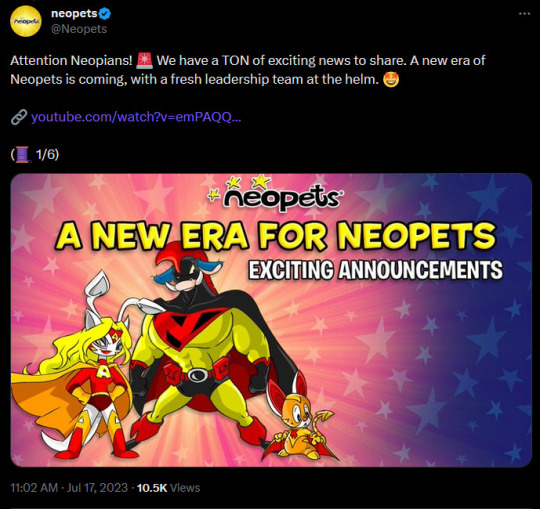
The Neopets Team announced today that they're under new management. They're no longer affiliated with Jumpstart (which announced their closure back in June) or their parent company NetDragon.
In their blog post in the official Neopets Medium page, they confirm that they are now an independent company:
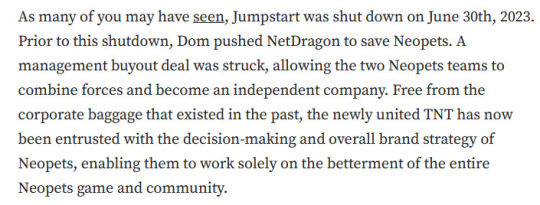
(Dominc Law, worked for NetDragon and was an old school Neopets player. He put together a team to work on saving the brand.)
Also in that blog post the team talks about how they are well aware of the problems the site has been through in the last decade, they acknowledge the lack of resources which resulted in the Neopets website being left broken.
Going ahead, they are going to focus on community requests, such as speeding up the process of Flash Games conversion, clearing up the page conversion backlog, bug fixes, mobile compatibility issues and improving customer support.
Most importantly, in my opinion, they clear up that they WILL NOT go forward with any Metaverse bullshit, and will instead work on creating a game that feels like Neopets:
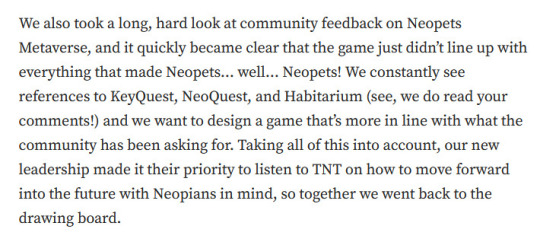
At this point, they have secured $4M in funding from various (unnamed) investors with additional funding from the management buyout. For the first time in forever, it looks like TNT has the resources they need to move the brand forward. In the blog post, they mention they have already hired developers and artists to work on the fixes the site needs.
From what it looks like, the game will be a mobile social life-simulation, parallel to the current website. We don’t have to worry that neopets.com will be replaced by a mobile app.
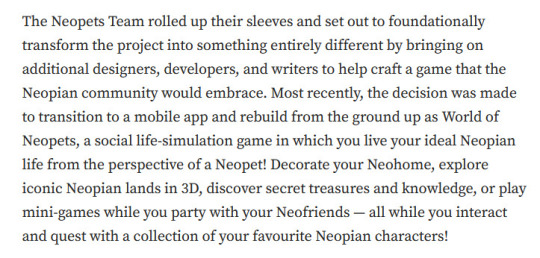
As of now, they have announced:
A brand new plot, scheduled for early 2024
A 2 million(!) NeoCash giveaway
More transparency with monthly updates from the team, scheduled AMAs
Neopets will be under the control of a new, unified entity: World of Neopia, Inc - the website will remain the same (neopets.com)
A Brand Ambassador Program
No longer going forward with NFT/Metaverse stuff
At the end, they published a FAQ with some answers that I found to be good and very interesting:
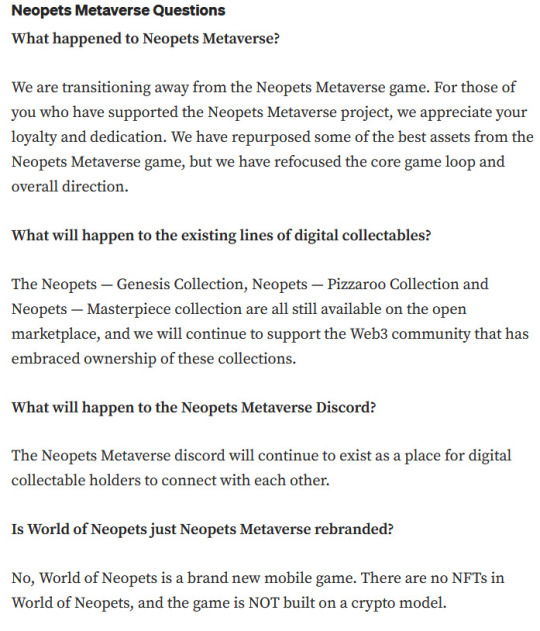
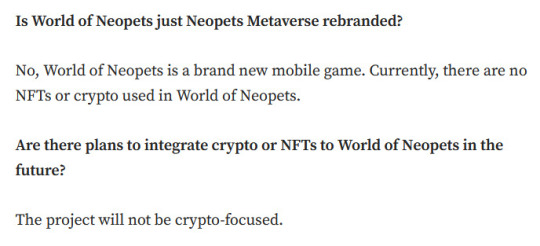
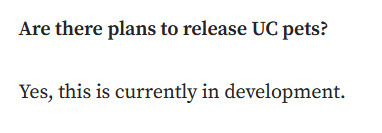
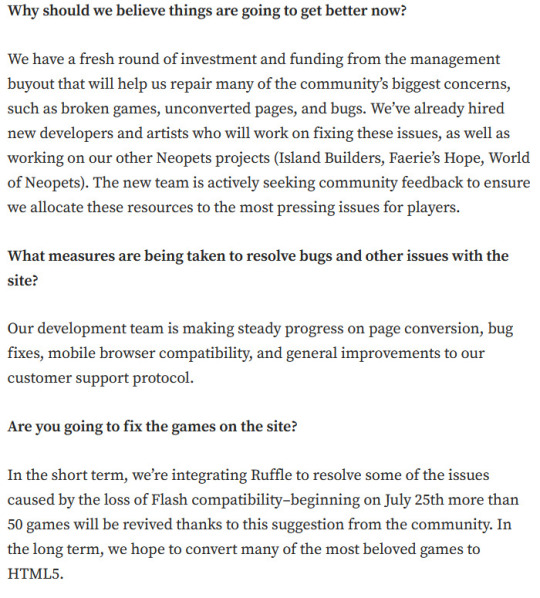
You can read the entire blog post here.
Or watch the YouTube announcement (which is way shorter):
youtube
#neopets#putting my journo degree to a good use i think#i am in no way affiliated with TNT or jumpstart or netdragon etc#i'm just really really happy#things look bright for once and i'd like to share the news#i know some people might be skeptical but i'd like to be optimistic for once and trust the team#most of them nowadays are old players if i'm not mistaken#i don't think they like to see the website in shambles as it was#also really goddamn glad they're moving away from crypto shit#i appreciate the transparency#also be nice to me i'm shy#Youtube#i admit i got a little lazy by the end#nostalgia#y2k nostalgia#kidcore#will these tags even show up
585 notes
·
View notes
Text
Web3 & Decentralized E-Commerce: What It Means for D2C Brands
The e-commerce landscape is evolving, and Web3 is at the forefront of this transformation. As decentralized technologies redefine how businesses operate, Direct-to-Consumer (D2C) brands must prepare for a future where transactions, ownership, and customer relationships are no longer controlled by centralized platforms. But what does this shift mean for the world of online retail?
Understanding Web3 & Decentralized E-Commerce
Web3 refers to the next phase of the internet—powered by blockchain, smart contracts, and decentralized networks. Unlike traditional e-commerce, which relies on intermediaries like marketplaces and payment processors, decentralized e-commerce eliminates middlemen, giving brands direct control over their operations, data, and revenue streams.
How Web3 is Reshaping D2C Brands
Ownership & Control: Web3 empowers brands to own their customer relationships without depending on platforms like Amazon or Shopify.
Decentralized Payments: Cryptocurrency and blockchain-based transactions reduce dependency on banks and lower payment processing fees.
Smart Contracts for Automation: Agreements between buyers and sellers can be self-executing, reducing fraud and ensuring seamless transactions.
Enhanced Data Privacy: Customers have greater control over their data, fostering trust between brands and consumers.
Tokenized Loyalty Programs: Brands can use NFTs and tokens to create exclusive membership benefits, driving deeper engagement and repeat purchases.
Challenges of Web3 in E-Commerce
Adoption Barriers: Many consumers and businesses are still unfamiliar with blockchain and decentralized systems.
Regulatory Uncertainty: Governments worldwide are still developing frameworks to regulate cryptocurrencies and decentralized transactions.
User Experience: While Web3 offers transparency, its technical complexity may create friction for non-tech-savvy consumers.
The Future of D2C in a Web3 World
Decentralized Marketplaces: Platforms like OpenSea and Rarible are paving the way for decentralized product selling.
Metaverse Shopping: Virtual storefronts could redefine the online shopping experience, allowing customers to interact with products in digital spaces.
Community-Led Growth: Web3 enables brands to build loyal communities through decentralized autonomous organizations (DAOs), where customers have a say in brand decisions.
Seamless Global Transactions: Cryptocurrency adoption will allow brands to expand globally without currency conversion hassles.
Is Your Brand Ready for Web3?
While Web3 is still in its early stages, D2C brands that adapt now will gain a competitive edge. Whether through tokenized rewards, decentralized payment systems, or blockchain-backed supply chains, the shift toward decentralized e-commerce is inevitable. The question is: Will your brand lead the change or struggle to catch up?
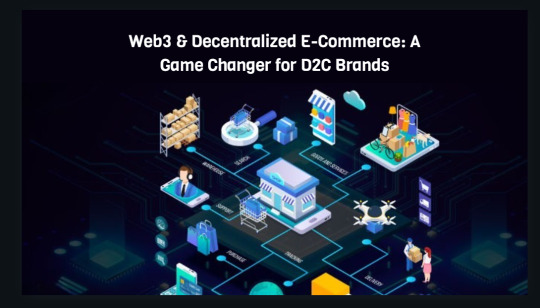
2 notes
·
View notes
Text
As we step deeper into the digital age, the metaverse is transforming how we interact, learn, and conduct business. This virtual universe, characterized by immersive experiences and interactivity, is rapidly becoming a cornerstone of innovation. In India, one company is at the forefront of this evolution: Simulanis Solutions. As a leading Metaverse Development Agency, Simulanis is committed to delivering cutting-edge solutions that empower businesses and engage users like never before.
#Metaverse Development Company#Metaverse Solutions Provider#Metaverse Platform Development#Custom Metaverse Development#Metaverse Game Development Agency#Metaverse Experience Design#Metaverse App Development#3D Metaverse Development#Metaverse VR/AR Integration#Metaverse Virtual Worlds#Metaverse Real Estate Development#Metaverse Consulting Services#Metaverse Integration Agency#NFT and Metaverse Development#Blockchain Metaverse Solutions#Interactive Metaverse Experiences#Metaverse for Business Solutions#Metaverse Marketing Agency#Metaverse Customization Services#Metaverse Ecosystem Development
0 notes
Text
Top 10 Emerging Tech Trends to Watch in 2025
Technology is evolving at an unprecedented tempo, shaping industries, economies, and day by day lifestyles. As we method 2025, several contemporary technology are set to redefine how we engage with the sector. From synthetic intelligence to quantum computing, here are the important thing emerging tech developments to look at in 2025.

Top 10 Emerging Tech Trends In 2025
1. Artificial Intelligence (AI) Evolution
AI remains a dominant force in technological advancement. By 2025, we will see AI turning into greater sophisticated and deeply incorporated into corporations and personal programs. Key tendencies include:
Generative AI: AI fashions like ChatGPT and DALL·E will strengthen similarly, generating more human-like textual content, images, and even films.
AI-Powered Automation: Companies will more and more depend upon AI-pushed automation for customer support, content material advent, and even software development.
Explainable AI (XAI): Transparency in AI decision-making becomes a priority, ensuring AI is greater trustworthy and comprehensible.
AI in Healthcare: From diagnosing sicknesses to robot surgeries, AI will revolutionize healthcare, reducing errors and improving affected person results.
2. Quantum Computing Breakthroughs
Quantum computing is transitioning from theoretical studies to real-global packages. In 2025, we will expect:
More powerful quantum processors: Companies like Google, IBM, and startups like IonQ are making full-size strides in quantum hardware.
Quantum AI: Combining quantum computing with AI will enhance machine studying fashions, making them exponentially quicker.
Commercial Quantum Applications: Industries like logistics, prescribed drugs, and cryptography will begin leveraging quantum computing for fixing complex troubles that traditional computer systems can not manage successfully.
3. The Rise of Web3 and Decentralization
The evolution of the net continues with Web3, emphasizing decentralization, blockchain, and user possession. Key factors consist of:
Decentralized Finance (DeFi): More economic services will shift to decentralized platforms, putting off intermediaries.
Non-Fungible Tokens (NFTs) Beyond Art: NFTs will find utility in actual estate, gaming, and highbrow belongings.
Decentralized Autonomous Organizations (DAOs): These blockchain-powered organizations will revolutionize governance systems, making choice-making more obvious and democratic.
Metaverse Integration: Web3 will further integrate with the metaverse, allowing secure and decentralized digital environments.
4. Extended Reality (XR) and the Metaverse
Virtual Reality (VR), Augmented Reality (AR), and Mixed Reality (MR) will retain to improve, making the metaverse extra immersive. Key tendencies consist of:
Lighter, More Affordable AR/VR Devices: Companies like Apple, Meta, and Microsoft are working on more accessible and cushty wearable generation.
Enterprise Use Cases: Businesses will use AR/VR for far flung paintings, education, and collaboration, lowering the want for physical office spaces.
Metaverse Economy Growth: Digital belongings, digital real estate, and immersive studies will gain traction, driven via blockchain technology.
AI-Generated Virtual Worlds: AI will play a role in developing dynamic, interactive, and ever-evolving virtual landscapes.
5. Sustainable and Green Technology
With growing concerns over weather alternate, generation will play a vital function in sustainability. Some key innovations include:
Carbon Capture and Storage (CCS): New techniques will emerge to seize and keep carbon emissions efficaciously.
Smart Grids and Renewable Energy Integration: AI-powered clever grids will optimize power distribution and consumption.
Electric Vehicle (EV) Advancements: Battery generation upgrades will cause longer-lasting, faster-charging EVs.
Biodegradable Electronics: The upward thrust of green digital additives will assist lessen e-waste.
6. Biotechnology and Personalized Medicine
Healthcare is present process a metamorphosis with biotech improvements. By 2025, we expect:
Gene Editing and CRISPR Advances: Breakthroughs in gene modifying will enable treatments for genetic disorders.
Personalized Medicine: AI and big statistics will tailor remedies based on man or woman genetic profiles.
Lab-Grown Organs and Tissues: Scientists will make in addition progress in 3D-published organs and tissue engineering.
Wearable Health Monitors: More superior wearables will music fitness metrics in actual-time, presenting early warnings for illnesses.
7. Edge Computing and 5G Expansion
The developing call for for real-time statistics processing will push aspect computing to the vanguard. In 2025, we will see:
Faster 5G Networks: Global 5G insurance will increase, enabling excessive-velocity, low-latency verbal exchange.
Edge AI Processing: AI algorithms will system information in the direction of the source, reducing the want for centralized cloud computing.
Industrial IoT (IIoT) Growth: Factories, deliver chains, and logistics will advantage from real-time facts analytics and automation.
Eight. Cybersecurity and Privacy Enhancements
With the upward thrust of AI, quantum computing, and Web3, cybersecurity will become even more essential. Expect:
AI-Driven Cybersecurity: AI will come across and prevent cyber threats extra effectively than traditional methods.
Zero Trust Security Models: Organizations will undertake stricter get right of entry to controls, assuming no entity is inherently sincere.
Quantum-Resistant Cryptography: As quantum computer systems turn out to be greater effective, encryption techniques will evolve to counter potential threats.
Biometric Authentication: More structures will rely on facial reputation, retina scans, and behavioral biometrics.
9. Robotics and Automation
Automation will hold to disrupt numerous industries. By 2025, key trends encompass:
Humanoid Robots: Companies like Tesla and Boston Dynamics are growing robots for commercial and family use.
AI-Powered Supply Chains: Robotics will streamline logistics and warehouse operations.
Autonomous Vehicles: Self-using automobiles, trucks, and drones will become greater not unusual in transportation and shipping offerings.
10. Space Exploration and Commercialization
Space era is advancing swiftly, with governments and private groups pushing the boundaries. Trends in 2025 include:
Lunar and Mars Missions: NASA, SpaceX, and other groups will development of their missions to establish lunar bases.
Space Tourism: Companies like Blue Origin and Virgin Galactic will make industrial area travel more reachable.
Asteroid Mining: Early-level research and experiments in asteroid mining will start, aiming to extract rare materials from area.
2 notes
·
View notes
Text
Best 10 Blockchain Development Companies in India 2025
Blockchain technology is transforming industries by enhancing security, transparency, and efficiency. With India's growing IT ecosystem, several companies specialize in blockchain development services, catering to industries like finance, healthcare, supply chain, and gaming. If you're looking for a trusted blockchain development company in India, here are the top 10 companies in 2025 that are leading the way with cutting-edge blockchain solutions.
1. Comfygen
Comfygen is a leading blockchain development company in India, offering comprehensive blockchain solutions for businesses worldwide. Their expertise includes smart contract development, dApps, DeFi platforms, NFT marketplaces, and enterprise blockchain solutions. With a strong focus on security and scalability, Comfygen delivers top-tier blockchain applications tailored to business needs.
Key Services:
Smart contract development
Blockchain consulting & integration
NFT marketplace development
DeFi solutions & decentralized exchanges (DEX)
2. Infosys
Infosys, a globally recognized IT giant, offers advanced blockchain solutions to enterprises looking to integrate distributed ledger technology (DLT) into their operations. Their blockchain services focus on supply chain, finance, and identity management.
Key Services:
Enterprise blockchain solutions
Smart contracts & decentralized apps
Blockchain security & auditing
3. Wipro
Wipro is known for its extensive research and development in blockchain technology. They help businesses integrate blockchain into their financial systems, healthcare, and logistics for better transparency and efficiency.
Key Services:
Blockchain consulting & strategy
Supply chain blockchain solutions
Smart contract development
4. Tata Consultancy Services (TCS)
TCS is a pioneer in the Indian IT industry and provides robust blockchain solutions, helping enterprises optimize business processes with secure and scalable decentralized applications.
Key Services:
Enterprise blockchain development
Tokenization & digital asset solutions
Decentralized finance (DeFi) applications
5. Hyperlink InfoSystem
Hyperlink InfoSystem is a well-established blockchain development company in India, specializing in building customized blockchain solutions for industries like finance, gaming, and supply chain.
Key Services:
Blockchain-based mobile app development
Smart contract auditing & security
NFT marketplace & DeFi solutions
6. Tech Mahindra
Tech Mahindra provides blockchain-as-a-service (BaaS) solutions, ensuring that businesses leverage blockchain for improved transparency and automation. They focus on finance, telecom, and supply chain industries.
Key Services:
Blockchain implementation & consulting
dApp development & smart contracts
Digital identity management solutions
7. Antier Solutions
Antier Solutions is a specialized blockchain development firm offering DeFi solutions, cryptocurrency exchange development, and metaverse applications. They provide custom blockchain solutions for startups and enterprises.
Key Services:
DeFi platform development
NFT & metaverse development
White-label crypto exchange development
8. HCL Technologies
HCL Technologies offers enterprise blockchain development services, focusing on improving security, efficiency, and automation across multiple sectors.
Key Services:
Blockchain-based digital payments
Hyperledger & Ethereum development
Secure blockchain network architecture
9. SoluLab
SoluLab is a trusted blockchain development company working on Ethereum, Binance Smart Chain, and Solana-based solutions for businesses across industries.
Key Services:
Smart contract & token development
Decentralized application (dApp) development
AI & blockchain integration
10. Mphasis
Mphasis provides custom blockchain solutions to enterprises, ensuring secure transactions and seamless business operations.
Key Services:
Blockchain for banking & financial services
Smart contract development & deployment
Blockchain security & risk management
Conclusion
India is emerging as a global hub for blockchain technology, with companies specializing in secure, scalable, and efficient blockchain development services. Whether you're a startup or an enterprise looking for custom blockchain solutions, these top 10 blockchain development companies in India provide world-class expertise and innovation.
Looking for the best blockchain development partner? Comfygen offers cutting-edge blockchain solutions to help your business thrive in the decentralized era. Contact us today to start your blockchain journey!
2 notes
·
View notes
Text
Keys to the Digital Future
The digital future is not merely a continuation of today’s technological trends; it is a transformative landscape where innovation, connectivity, and sustainability intertwine to redefine how we live, work, and interact. As we step into this exciting future, understanding its essential components can empower individuals, businesses, and societies to thrive. Here are the key elements shaping the digital future:
Artificial Intelligence (AI) and Machine Learning (ML)
AI and ML are at the forefront of the digital transformation. These technologies are driving advancements in automation, data analysis, and decision-making. From personalized recommendations to autonomous vehicles, AI’s capabilities are reshaping industries. The future lies in ethical AI development, ensuring these tools enhance human lives while minimizing biases and risks.
The Internet of Things (IoT)
The IoT connects devices, systems, and people, creating an ecosystem of interconnectivity. Smart homes, wearables, and industrial IoT solutions are just the beginning. As 5G and edge computing mature, IoT’s potential to streamline operations and improve efficiency will expand exponentially, transforming everything from healthcare to urban planning.
3. Sustainable Technologies
The digital future must align with global sustainability goals. Renewable energy, energy-efficient data centers, and green computing practices are essential for reducing the environmental footprint of technology. The circular economy, which emphasizes recycling and repurposing electronic waste, will play a significant role in creating a sustainable digital ecosystem.
Cybersecurity and Privacy
As technology evolves, so do the threats associated with it. Cybersecurity is a cornerstone of the digital future, requiring robust frameworks to protect data and infrastructure. Privacy-centric technologies, such as blockchain and zero-knowledge proofs, offer innovative ways to safeguard user data and build trust in digital systems.
Digital Inclusion and Accessibility
A truly transformative digital future is one that is inclusive and accessible to all. Bridging the digital divide requires investments in infrastructure, affordable devices, and digital literacy programs. Technologies must be designed with accessibility in mind, ensuring equitable opportunities for everyone, regardless of location, ability, or socioeconomic status.
Quantum Computing
Quantum computing has the potential to solve problems that are currently beyond the reach of classical computers. By leveraging quantum mechanics, these machines can revolutionize fields such as cryptography, drug discovery, and climate modeling. While still in its infancy, quantum computing is a critical component of the digital frontier.
The Metaverse and Virtual Realities
The metaverse represents the convergence of physical and digital realities. Virtual and augmented reality technologies are enabling new ways of interaction, education, and entertainment. Businesses are leveraging these immersive environments for training, product design, and customer engagement, laying the foundation for a blended digital-physical world.
Ethical Leadership in Technology
The digital future demands leaders who prioritize ethics and societal well-being. From addressing algorithmic biases to ensuring responsible AI deployment, ethical leadership is crucial for fostering innovation that aligns with human values. Transparency, accountability, and collaboration will be key to navigating complex ethical challenges.
Education and Lifelong Learning
As technology evolves, so must our skills. The future workforce will require adaptability and continuous learning to keep pace with new tools and paradigms. Education systems must evolve to emphasize digital literacy, critical thinking, and collaboration, preparing individuals for the demands of a rapidly changing digital landscape.
Global Collaboration
The digital future is a global endeavor, requiring collaboration across borders, industries, and disciplines. Shared goals, such as mitigating climate change and advancing healthcare, necessitate partnerships that leverage collective expertise and resources. International cooperation will ensure that technological advancements benefit humanity as a whole.
The keys to the digital future lie in innovation, inclusivity, and sustainability. By embracing these principles and addressing the challenges they present, we can unlock unprecedented opportunities for growth and prosperity. As we navigate this dynamic journey, the digital future promises to be a realm of endless possibilities, limited only by our imagination and commitment to shaping it responsibly.
2 notes
·
View notes
Text
How to Choose the Right Custom Blockchain Development Company
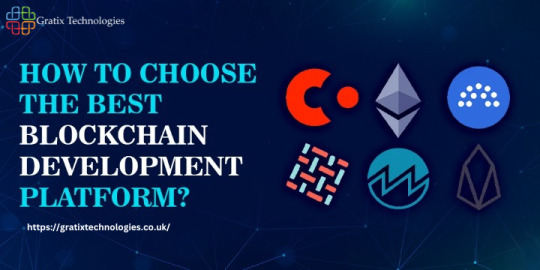
Custom blockchain development is the process of creating a unique and tailored solution to meet the specific needs of businesses. It involves designing and developing a blockchain network from scratch or customizing an existing gratix technologies platform to suit the requirements of a particular organization.
Why is custom blockchain development important for businesses?
In today’s fast-paced and data-driven world, businesses are constantly seeking innovative solutions to enhance security, improve efficiency, and streamline processes. This is where custom blockchain development Company comes into play. By harnessing the power of technology, businesses can create decentralized and transparent systems that offer enhanced security, efficient transactions, and automated processes. Custom gratix technologies solutions can be tailored to address specific challenges and provide unique advantages to businesses in various industries.
Benefits of Custom Blockchain Development for Businesses
Custom blockchain development offers businesses an unparalleled level of security and transparency. gratixtechnologies networks are built on a decentralized architecture, making it extremely difficult for hackers to compromise the system. Additionally, the transparency of blockchain ensures that all transactions are recorded and visible to authorized participants, reducing the risk of fraud and manipulation.
Custom Blockchain Development Life Cycle: Process and Methodologies
The Blockchain development Company process begins with gathering and analyzing the business requirements. This phase involves understanding the specific challenges and objectives of the organization, identifying the key stakeholders, and defining the scope of the project.
Development and implementation
In this phase, the custom blockchain solution is developed and implemented according to the defined architecture. The development team builds the necessary blockchain infrastructure, smart contracts, and user interfaces. They also integrate the solution with existing systems, if required.
Deployment and maintenance
Once the solution has been thoroughly tested and deemed ready for production, it is deployed to the live Blockchain development Company environment. Ongoing maintenance and support are provided to ensure the smooth operation of the network. Regular updates and upgrades may be required to adapt to changing business needs and advancements in technology.
Use Cases and Industries Leveraging Custom Blockchain Solutions
Blockchain technology has revolutionized the financial services and banking industry. Custom blockchain solutions are being used for secure and transparent transactions, cross-border payments, smart Blockchain development Company contracts, and more. We can say goodbye to lengthy verification processes and hello to speedy and efficient financial operations.
Supply chain management
Supply chain management has always been prone to inefficiencies and lack of transparency. However, with custom blockchain solutions, these challenges can be overcome. enables end-to-end visibility, real-time tracking, and secure record-keeping, ensuring that every step in the supply chain process is traceable and accountable. It’s like having a supply chain superhero on your side.
Healthcare and pharmaceuticals
In the healthcare and pharmaceutical industries, privacy, security, and trust are of utmost importance. Custom blockchain solutions are becoming a game-changer in these sectors by providing secure data sharing, interoperability between healthcare providers, and efficient management of patient records. Professionals can focus on saving lives rather than dealing with administrative tangles.
Real estate and property management
Buying, selling, and transferring properties has never been easy. However, custom blockchain solutions are making waves in the real estate and property management sectors. development Company provides a tamper-proof and transparent ledger for property transactions, eliminates intermediaries, ensures faster and secure payments, and simplifies the entire process. It’s like having a virtual real estate fairy godmother.
Future Trends and Opportunities in Custom Blockchain Development
As blockchain technology evolves, the need for interoperability between different platforms becomes crucial. Interoperability allows seamless communication and sharing of data between gratix technologies and different networks, opening up a world of possibilities.
Increased adoption in government and public sectors
Governments and public sectors across the globe are waking up to the potential of gratix technologies. have the power to transform governance, enhance transparency, and improve public services. As its benefits become more evident, we can expect to see increased adoption of custom blockchain development in government and public sectors.
Conclusion
Custom blockchain development services offer immense opportunities for businesses across industries. The benefits of enhanced security, improved efficiency, and streamlined processes cannot be overstated. However, it is crucial to carefully consider key factors when choosing a custom Custom Blockchain Development Company, ensuring they have the necessary experience and expertise. The development life cycle, industry use cases, and the challenges involved should also be taken into account.
#Metaverse Development Company#Blockchain development Company#Custom Blockchain Development Company#DeFi Development Company#Blockchain Consulting Company#blockchain#digital marketing#gratixtechnologies
1 note
·
View note